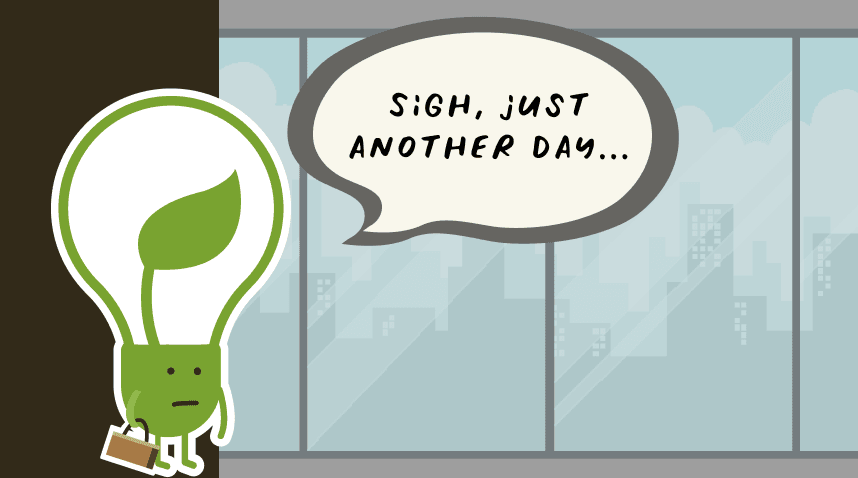TLDR: As employees, we probably all know the practical reasons and benefits of Quiet Quitting. You don’t invest more time or effort than you are required to, and you have more time to explore other passions or priorities outside of work. In this article, we explore the impact of Quiet Quitting from other lenses, such as the Coaching lens and the Buddhist lens.
What is Quiet Quitting ?
Quiet quitting doesn’t actually refer to quitting a job—it means completing one’s minimum work requirements without going above and beyond or bringing work home after hours.
Corporations and individuals are struggling to adapt to these phenomena in this ‘post-covid’ world. The idea of Work and our attitudes towards it have shifted, prompting many individuals also to adopt their own coping mechanisms such as ‘Quiet Quitting’.
Cost of Quiet Quitting

From my personal experience as a career and leadership Coach, I have heard all sorts of reasons why people ‘Quiet Quit’. Some employees cite burnout as a key reason, and others think that ‘going above and beyond’ is simply not worth it.
One of my coachees has put in many late nights and volunteered to lead extra projects at work, for the sake of pushing for a promotion.
After a year of doing all these, the management decided to restructure, and it meant her promotion just wasn’t on the table anymore.
My first question to my client is ‘Why don’t you just quit for real?’. It is important to understand what’s holding us back from throwing the letter and to grasp what is the cost of staying but not being fully engaged in the current job.
There are of course many different circumstances of ‘Quiet Quitting’, where individuals argue they are still fulfilling the minimum expectations of the job. There are some employees who still fulfil basic tasks mindlessly, often not putting in much effort nor being very efficient.
They tend to say things like “since I can’t change the stupid processes, I will just follow lor.”
There are other employees whose work does not resonate with their personal values and purpose. Hence they often cannot find meaning or fulfillment in their work, and tend to look outside of their day job for it.
Also, some individuals are already plateauing in their role, therefore not finding their work challenging anymore.
Without a sense of challenge, it is hard to feel any sense of professional growth or achievement. They might just ‘cruise along and maintain status quo’.
The cost of Quiet Quitting is also detrimental to the employer, who struggles to get a productive workforce, and the team, who has to deal with a mentally checked-out individual.
It might affect the team dynamics negatively, where other team members have to pick up the slack. When the employee has lost motivation, there might also be a ripple effect on the overall energy of the team.
In extreme cases, the Quiet Quitter is resentful, perhaps due to perceived unfairness or stuckness, and can demonstrate strong negative emotions at work.
But what about the Quiet Quitter? What are the unseen costs to the individual?
The unseen costs of quiet quitting.

While Quiet Quitting might seem to be a plus for the employee who can slack off and get to what interests them, as a career coach, I am aware of the detrimental side effects to both the individual and his/her/their relationships.
When we spend 8 hours of our time every day on something that does not resonate with us, it is hard to find joy and fulfilment. Even if we tell ourselves it is just for a paycheck, it is hard not to feel stuck.
“What is the cost of doing this, to yourself?” I might ask the Quiet Quitter. “If you had only 1 month to live, would you be doing this?”.
Sometimes I would ask my coachees, ‘How do YOU feel going to work every day?’ I have not had a single client who said he/she was truly ‘Happy’ or even ‘At peace’.
As most of us reading this probably still hold onto a sense of ‘Self’ [1] to some degree, this unhappiness stems from not being resonant with your true ‘Self’ at work. It is hard to feel satisfaction at work when you are not being your true/best ‘Self’.
When we think about this from a Buddhist perspective, are we really being kind [2] to ourselves, and colleagues around us? Is there still ‘Suffering’ [3] , even if we have mentally checked out?
So with a boundless heart
Should one cherish all living beings;
Radiating kindness over the entire world:
Spreading upwards to the skies,
And downwards to the depths;
Outwards and unbounded,
Freed from hatred and ill-will.
Whether standing or walking, seated or lying down
Free from drowsiness,
One should sustain this recollection.
This is said to be the sublime abiding.
By not holding to fixed views,
The pure-hearted one, having clarity of vision…
The Buddha’s Words on Loving-Kindness [4]
If we are being kind to ourselves, our colleagues, our family and our friends, what do we want for ourselves and others? As Buddhists, do we not want to radiate kindness, love, and freedom to all beings around us?
My coachees often say they want clarity in life. Sometimes clarity appears when we explore metaphors and visualizations.
“When you say you want to feel free of ill-will, what image comes to mind?” One of my coachees, Mr S from California said to me last week, “If only I could pick up my surfboard again and feel the sun on my back, fearlessly riding the waves in the ocean.”
Another coachee in Switzerland told me, “I want to put down my very heavy backpack. I have been carrying my husband and three kids in it for the last six months, climbing up the Swiss Alps. I just wish to put it down by the lake and the kids can come out and play happily.”
We might not be a hundred percent clear of what exactly we want, but we know exactly what we don’t want. Try asking ourselves, “How do we want to Feel?” instead.
We might want to feel the warmth of the sun, the carefreeness of surfing, the achievement of riding the big waves, the lightness of not carrying everyone or the joy of having fun together.
What’s next?
The purpose of this article is not to judge whether ‘Quiet Quitting’ is right or wrong, nor to tell you what to do next. It is simply to bring awareness to your situation and what you are feeling.
Some questions to help your contemplation if you noticed you are Quiet Quitting:
- On a scale of 1 to 10 how engaged are you at work? (1 being your soul has left the building, 10 being super engaged and flourishing)
- What’s stopping you from being fully engaged?
- How much is this job aligned to your Values?
- What are the benefits you can get from this job? (monetary and non-monetary such as knowledge, experience, network etc)
- How could you reframe your perspective or reshape your role?
- What is the cost of staying in your current job? (any negative emotions, physical tension/pain etc)
- If money is not a consideration, what options are possible for you next?
As we contemplate, do bear in mind that our jobs are impermanent, our emotions are impermanent, and the economic crisis is impermanent. And we probably will be talking about another new trend a couple of months from now. 🙂
References:
- Anatta-lakkhana Sutta: The Discourse on the Not-self Characteristic
- Karaniya Metta Sutta: The Buddha’s Words on Loving-Kindness
- Saṁyutta Nikāya: Connected Discourses on the Truths
- The Noble Eightfold Path: The Way to the End of Suffering by Bhikkhu Bodhi


